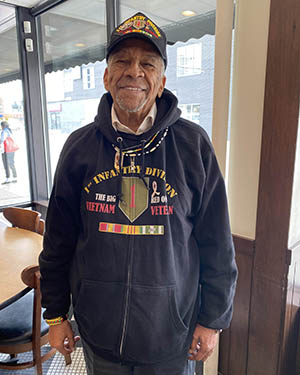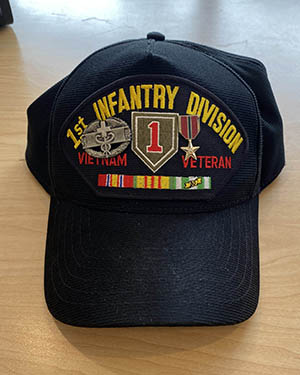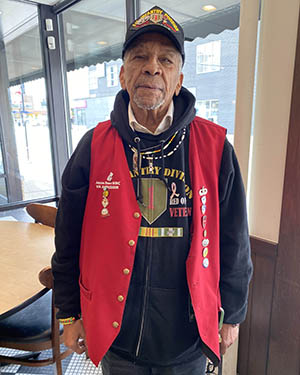Army Korean War and Vietnam War Chicago, IL Flight date: 10/18/23
By Marilyn Lucas, Honor Flight Chicago Veteran Interview Volunteer
William “Cecil” Johnson celebrated his 18th birthday in 1954 by joining the army with the intention of becoming a ”lifer”. He was shipped immediately to Fort Ord in California for his basic training. After basic training, Cecil was sent to Fort Sam Houston, which is the medical training center for the army. He was trained as a medic (Battalion aid) specifically dealing with emergencies in the field. Field/combat medics are trying to provide medical care in an operational or combat environment. They provide Frontline trauma and medical care to deployed personnel while also caring for those suffering from disease, as well as those injured in combat. This field training would serve him well later in his career in Vietnam. The next three years of his service were spent in Fontainebleau, France (known as the family home of French monarchs) working in hospital wards dealing with blood draws and med distribution. The allied forces for central Europe had four headquarters located in Fontainebleau, France during the 1950’s. The American served an integral part during the French/Algerian conflicts.
Cecil certainly became a world traveler during those years. He served a 16 week stint in Landstuhl, Germany for further medical training. After this short training, Cecil was sent to Paris as a blood bank tech. He was assigned to SHAPE, Supreme Headquarters Allied Powers Europe, which is the military headquarters of the North Atlantic Treaty Organization’s Allied Command Operations that commands all NATO operations worldwide. Cecil shared an amusing story regarding identification cards in France. At that particular time in history, the French Algiers were not well received in France. It was common to carry two identification cards, One card to show you were an American, and another to show you were French Algiers. If you were stopped by the French Algiers, you would show the Algiers ID card, and if stopped by the French, you would show the American ID card. Cecil laughed saying, “this would keep us out of trouble“. They also had to wear civilian clothes because of the Algiers’ uprising and discontent with American interference by some of the factions.
During his time in Paris, Cecil was promoted to Sergeant/senior medic. This sudden promotion came at a time in Paris when there were many discussions regarding racism in the American military. Cecil always questioned the sudden promotion, wondering if it was an appeasement to prove the American military was not racist.



The late 1950s saw the start of the Sante Sobriete campaign. The French government’s purpose was to limit the consumption of alcohol. Cecil and his medic friends came to an amusing solution to the problem. They started stockpiling grain alcohol in September to prepare for holiday parties in Paris. “American ingenuity“! From 1960 to 1961 Cecil served in Korea. He was assigned to the US boxing team as a medic. Service men in Korea were placed in hotels, as there were not any barracks available at that time. Not only did the soldiers stay in hotel rooms, but they also had house boys to clean and service their rooms.
The house boys were all nicknamed “Slicky”. This nickname came from the fact that many things would disappear from the GIs’ rooms. Cecil had a cure for that problem. Every night there were two pieces of chocolate placed by their bedside, unfortunately, Cecil’s chocolate always seem to disappear. Cecil decided to substitute that chocolate with a laxative. The rest of that story we will leave to your imagination
From 1961 to 1963 he was back in Frankfurt Germany to become proficient in all medical fields. He was also trained to become a Ward Master. Cecil explained that many battalions during the war did not have a doctor, thus the medic served as the battalion’s doctor.
In 1963 Cecil returned to the United States and was stationed at Fort Riley, Kansas. Fort Riley was the home of the First Infantry Division also known as “Big Red.” The famous actor, Lee Marvin, helped to make the First Infantry famous in the movie called The Big Red One. Cecil served in the 2nd Battalion 18th Infantry. It was during this time Cecil met his wife and married. With his wife pregnant in 1965, Cecil left California thinking they were going to Okinawa for TDY. Surprisingly, they were told once they left California, they’re real destination was Bien Hoa, Vietnam.
Feeling a Little dusty from the travel Cecil went to take a bath the very first night. While he was bathing they were attacked. He recalls the panic of trying to find his weapon. With difficulty, Cecil shared an incident where he was forced to give a command to blow up a hut not knowing exactly who was in the house. At the time, his Lt. had been wounded and he was forced to take over command.
Sergeant Johnson, in the picture, is wearing the Bronze Star on his hat that was awarded to him for his Courageous Service on the battlefield. One of the soldiers had triggered a “booby trap” while searching for dead bombs in an unmarked live minefield. Medic Sergeant Johnson rushed in and saved 32 lives on that battlefield. According to Cecil, all survived except for one due to the fact that he ran out of morphine.
Cecil returned home in 1966. Upon the request of his wife he did not continue a career in the military. He went on to work for the Chicago Transit Authority for 25 years in Chicago until 1994 when he retired. WELL…we use the word retire loosely, he is one of the most well-known volunteers at Jesse Brown medical center since 1996. He arrives every morning at 4:30 AM leaving at noon depending on what is needed. He is known for his exuberant and enthusiastic greetings for all the patients. In his own words “Sometimes it’s good morning and sometimes it’s good night for the overnighters. I’ve got a little something for everyone.”
The VA under secretary of health Dr. Shereef Elnahal acknowledged Mr. Johnson service: “On the days when Mr. Johnson is not on duty, one of the first questions staff and patients often ask is, ‘Where is Cecil?’ He makes a difference in our lives and the lives of everyone who enters the doors of Jesse Brown, and we all care about him as a key member of our Jesse Brown family.” He became the symbol of the red coat ambassador program at Jesse Brown.
We salute you Cecil for a life of unending service. You are a gift to our country. Your never ending dedication serves as an example to all Americans.
Cecil, thank you for your years of service to our country. Enjoy your day of honor as you experience Washington DC for the first time.


